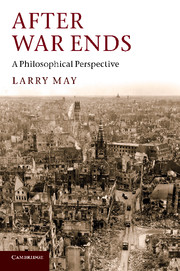Chapter 1 - Introduction
Normative principles of jus post bellum
Published online by Cambridge University Press: 05 June 2012
Summary
In this book, I draw on the work of Hugo Grotius to provide a Grotian account of the normative principles of jus post bellum, governing practices after war ends. In this sense I will aim to fill a gap in the literature concerning the Just War. There is extensive discussion of the normative principles that should govern the initiation of war, jus ad bellum, and also of the conduct of war, jus in bello. But there has been very little work on jus post bellum. In taking Hugo Grotius’s work, De Jure Belli ac Pacis, as my point of departure I will seek to ground the normative principles after war ends in the 400-year-old secular tradition of writing about the Just War. I will also attempt to connect this tradition with the emerging international law literature on transitional justice which is primarily concerned with how to move from a position of mass atrocity or war to a position of peace and reconciliation. In the end I will depart from the advocates of the Just War and argue that contingent pacifism is most in keeping with normative principles after war ends.
In this introductory chapter I will set out what I take to be the six normative principles of jus post bellum: rebuilding, retribution, reconciliation, restitution, and reparation, as well as proportionality. I will also address one of the thorniest of issues: what difference should there be between victors and vanquished in terms of post war responsibilities. And even more importantly, how much difference should it make if the victor had begun the war without just cause? In one sense, this is a seemingly easy question to answer – the party who has done wrong should pay for damages caused by its wrongful behavior. If the war was begun wrongly then everything that follows is the responsibility of this wrongdoing party. But in another sense, this is a deeply difficult issue since the point of jus post bellum is to establish a just and lasting peace, and yet this is very unlikely to happen unless both parties see themselves as responsible for the post war reconstruction.
- Type
- Chapter
- Information
- After War EndsA Philosophical Perspective, pp. 1 - 26Publisher: Cambridge University PressPrint publication year: 2012

